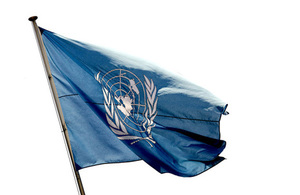UNGA 73 First Committee: UK Statement on Nuclear Weapons
The UK delivered their statement to the UNGA where they reinforced their commitment to the Nuclear Non-Proliferation Treaty and highlighted their issues with the Nuclear Weapons Ban Treaty.

UN Flag
The UK aligns itself with the statement delivered by the European Union. I would like to make some remarks in a national capacity.
The Nuclear Non-Proliferation Treaty is nearly fifty years old. Brokered by consensus, underpinned by the IAEA safeguards regime, and offering tangible benefits to all its signatories, it has helped make us more secure. The dark predications cast in the 1960s and 1970s of dozens of nuclear armed states have not come true.
The UK remains strongly committed to the NPT and the step-by-step approach to disarmament. We will actively work for a successful outcome at the 2020 Review Conference and continue to campaign for universalisation of the Treaty.
We will continue to support the Comprehensive Test Ban Treaty and Organisation and the completion and sustainment of its verification regime. The invaluable work carried out by the CTBTO relies on its Member States paying their dues, on time and in full.
We support the start and early conclusion of negotiations of a Fissile Material Cut-Off Treaty in the Conference on Disarmament as an essential step to complete global nuclear disarmament.
We will continue our leading role in disarmament verification, including through IPNDV and the Quad initiative with the US, Sweden and Norway.
We do not intend to support, sign or ratify the Nuclear Weapons Ban Treaty. The Ban Treaty risks undermining the NPT, and ignores the security situation and the considerable technical and procedural challenges involved in nuclear disarmament.
Mr Chair,
We have a collective obligation to support and reinforce the existing counter-proliferation framework.
The UK and its Allies have raised serious concerns about Russian compliance with the Intermediate Nuclear Forces Treaty. Russia has offered no credible response. Russia has developed capabilities that are destabilising European security. Russia must demonstrate its compliance with the Treaty in a substantial and transparent way and engage in constructive dialogue with the US.
The Joint Comprehensive Plan of Action with Iran represents a major step forward in preventing Iran from developing a nuclear weapons capability. The UK is committed to the full and long-term implementation of the Joint Comprehensive Plan of Action by all remaining parties to the deal.
At the same time, we have significant concerns over Iran’s ballistic missile programme, which is inconsistent with UNSCR 2231 (2015).
The UK welcomes the opportunity created by President Trump’s historic meeting with Kim Jong Un. It is vital that the DPRK takes concrete actions towards denuclearisation, as agreed at the Singapore Summit. International pressure and robust UN sanctions have played a key role. Sanctions must continue to be strictly enforced until the DPRK takes concrete steps towards complete, verifiable, and irreversible denuclearisation.
Mr Chair,
Given the unpredictable security environment we face today, the UK must maintain our nuclear deterrent for the foreseeable future. States might use their nuclear capability to threaten us, or try to constrain our decision-making in a crisis; and there is a risk of further proliferation of nuclear weapons. The threats from nuclear capable states are very real and any potential aggressor must be assured that the consequences of an attack far outweigh the benefits.
The UK takes its responsibilities as a Nuclear Weapons State very seriously, demonstrated by our Negative Security Assurances regarding the use and threat of use of nuclear weapons, our commitment to a minimum credible deterrent, and our transparency about our arsenal and declaratory policy.
We maintain the voluntary moratorium on the production of fissile material for use in nuclear weapons or other explosive nuclear devices in place since 1995.
We have met our 2010 Strategic Defence and Security Review commitment to reduce the number of deployed warheads.
We have reduced the number of operationally available warheads to no more than 120. We remain committed to reducing our overall nuclear weapon stockpile to no more than 180 warheads by the next decade.
Despite the challenging security backdrop, we remain determined to work with partners across the international community to prevent proliferation, improve verification and make progress on nuclear disarmament.